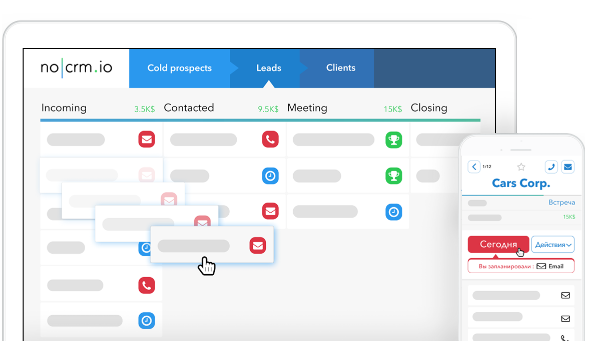
Today’s business environment is more hyper-connected than ever. With fully distributed teams and remote work being more widespread than in the past, especially post-pandemic, it’s not uncommon for sales teams to find themselves coordinating across multiple time zones and geographical regions. And as the frontline operators in any business, reps and their managers, need a reliable, efficient, and cost-effective way to connect with their clients and colleagues at the drop of a hat.
Traditional tools, such as email and integrated calendars, continue to play an important role in the communication process. But throughout the course of a standard working day, a more personal touch is often required, whether that’s to facilitate a one-on-one check-in or as part of a standard end-of-day recap meeting.
That’s where VOIP (Voice Over Internet Protocol) software comes in. Read on to learn more about the VOIP advantages and disadvantages when it comes to the fast-paced world of modern sales teams.
What Is VOIP Software?
Put simply, VOIP software is any software program that allows people to talk in person using an internet connection. The traditional methods of phone calls and boardroom dial-ins are fast becoming a thing of the past, with VOIP allowing any member of a sales team to connect with their colleagues, managers, or clients as long as they have an internet connection.
VOIP itself isn’t a brand-new concept. Skype was one of the first mass-market tools to take the world by storm, revolutionizing the idea of phone calls and ushering it into the modern age. But as time has progressed, so too has the technology. Today, there are dozens of VOIP software tools on the market, each with their own pros and cons.
The focus of this article isn’t to compare them, however (for that, check out our deep-dive Top 10 Cloud VOIP Apps article, where we get into the nitty-gritty of one particular program versus another). Instead, we’ll be discussing the advantages and disadvantages of VOIP more generally. Without further ado, let’s dive in.
Advantages of VOIP Software for Sales Teams

Cost Efficiency
Margins are everything in business, and when it comes to managing sales teams, budget outlay should be a significant concern for any manager or top-line coordinator. After all, you’re already spending money training, employing, and providing resources for your sales team to use. The costs can quickly balloon out of control if you don’t keep a close eye on every single outgoing expense.
To that end, one of the most compelling advantages of VOIP by far is its cost-effectiveness.
Compared to traditional phone systems, which typically involve hefty installation and maintenance costs, VOIP software systems are cheaper across the board. Given that they require a significantly reduced upfront investment, it’s easier to bootstrap a new sales team or keep an existing one flexible without breaking the bank.
But the cost efficiency doesn’t stop there. In the long run, long-distance and international call charges will pale in comparison to what you’d expect to spend with legacy phone systems, even with a volume-friendly bulk plan in place.
Flexibility and Mobility
Back in the day, sales reps used to need to be in a specific location together to do their work. With the new work-from-home era well and truly upon us, that necessity has become a distant memory. Teams aren’t tethered to a single place anymore, which makes sense. Given the constantly online, 24/7 nature of modern business, reps and managers need to be as flexible as the clients they’re servicing.
Being able to make and receive calls anywhere offers a competitive advantage that could make all the difference when it comes to closing that one deal or getting another commitment over the line.
One of the main advantages of VOIP is that it provides exactly this flexibility. As long as a salesperson has a stable Internet connection, they’re ready to go, meaning there’s never any reason to drop the ball.
Especially valuable for distributed teams that need to be responsive to ever-changing client demands, the mobility provided by VOIP software is a significant plus compared to legacy phone systems.
Advanced Features
It’ll probably come as no surprise to learn that, like so many other modern software programs, today’s VOIP systems come jam-packed with advanced features that are tailor-made for enhanced sales efficiency. From call forwarding and voicemail to transcription to conferencing capabilities, sales teams using VOIP software can count on a smarter, more well-rounded workflow that’s flexible enough to suit any situation that may arise.
With features like call recording allowing for real-time quality control and ongoing training at the click of a button, it’s not just about dialing and talking anymore: every single step is a chance for enhanced productivity.
And for bigger teams, collaboration features designed to streamline communication and take the guesswork out of working on deals together are a game-changer.
Integration with CRM Systems
Any modern sales team needs a CRM in one form or another. Customer Relationship Management systems are designed to facilitate every aspect of the sales process, from initial lead generation and nurturing all the way to the final conversion. That’s where another major advantage of VOIP programs comes into play: seamless integration with CRMs.
By enabling sales teams to manage calls directly from the CRM interface, it’s easier than ever to ensure that no interactions slip through the cracks. Rather, they’re instantly logged and analyzed for future reference, making every deal that much more valuable and helping each individual rep to keep their own workflow as clean and efficient as possible.
By the way, if you’re looking for a CRM for your sales operations, why not check out noCRM? Lightweight, flexible, full of all the tools you need and not bloated with features you don’t, it’s the ideal way to give your sales team a killer edge in the fast-paced sales world of 2024. Click here to learn more about noCRM and how it integrates with VOIP software.
Disadvantages of VOIP Software for Sales Teams

Perfection is rarely found in the world of business, and as compelling as their advantages undoubtedly are, VOIP software is no exception.
Here are some of the most important disadvantages of VOIP to keep in mind with regards to these tools.
Dependency on Internet Quality:
The most obvious potential issue with VOIP programs is their reliance on a good internet connection. We’ve all been in Zoom calls where the quality leaves a little to be desired. Scale this up to the ongoing operations of an entire sales team, and it’s easy to see where their efficiency could suffer.
With poor connections leading to call drops, delays, and less-than-crystal-clear voice quality, it’s a genuine issue with using VOIP software to coordinate sales teams. And as much as everybody would like things to be different, there’s no easy solution.
VOIP programs need a good internet connection to work to their full potential; if your team doesn’t have that, you’re out of luck.
Security Concerns
Like any internet-based technology, VOIP systems are vulnerable to cyber threats like hacking and eavesdropping. Granted, this isn’t likely to be a major concern for the vast majority of sales teams. The providers of these software programs have implemented robust security measures, reducing the major risks of getting hacked, and for the regular day-to-day work most reps and their managers do, there’s really nothing to be overly worried about.
Having said that, hacks can and do happen, and when they do occur, their consequences can be disastrous. Compared to legacy phone systems, VOIP systems, with their total exposure to the internet, are more vulnerable—but it’s worth keeping in mind that they’re no more inherently vulnerable than any other connected software programs.
Complexity and Training
Getting up and running with a VOIP system can be more complex than with traditional systems, especially for larger organizations who may have more involved needs. With time, of course, everybody on the team will become familiar with the software and should have no trouble using it to reap the rewards of enhanced efficiency.
However, the onboarding process can be a significant time and energy drain, especially if a team is swapping over from one program to another.
The initial headache will, for most teams, be more than counterbalanced by the potential benefits, though.
And whether it’s a one-off session or ongoing training, the time invested into learning how to use the software properly—while an admitted disadvantage of VOIP—will pay dividends in the long run.
Conclusion
Regardless of where you stand on the old-school versus new-school debate, it’s clear that the advantages and disadvantages of VOIP software programs lean towards the positive. These programs offer a range of benefits for modern sales teams, especially those with reps and managers distributed across the world. By providing advanced features unparalleled levels of flexibility at increased levels of cost-efficiency, it’s a consideration every manager should spend some time on.
Granted, there are drawbacks as well, chief among them the dependency on a good internet connection. But for the most part, it’s clear to see that the upsides significantly outweigh the downsides. After all, the sales world is faster and more high-paced than ever in 2024, and it’s vital that your business has the communication tools it needs to keep up.


